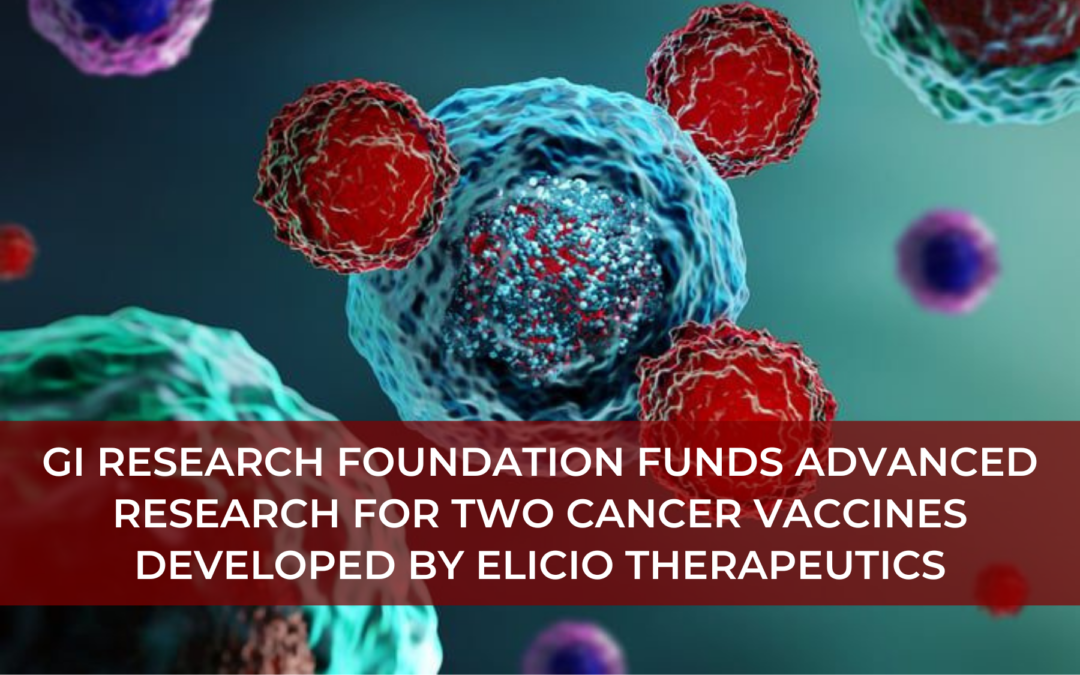Backed by $5.4 million in grants from the GI Research Foundation, prospective cancer vaccines developed by Elicio Therapeutics show strong T-cell activation in animal trials. And similar vaccines from Elicio are already in human trials.
CHICAGO, February 19, 2024, GI Research Foundation – Many cancer vaccines have been proven to successfully trigger the production of the T-cells that fight disease – and to help T-cells find and attack tumors. These vaccines are almost model employees; they have the tools they need to do their jobs well.
Despite their skills, however, these employees have a big problem. They’re terrible commuters and rarely make it to the office.

Peter DeMuth, PhD of Elicio Therapeutics
“Many vaccines are designed well and show the right activity on the immune cells they are intended to target, but after dosing, they are diffused widely throughout the body. Either they don’t make it to their destination – the lymphatic tissue, the command center for our body’s immune response – or don’t stay there,” said Peter DeMuth, PhD, Chief Scientific Officer at Elicio.
Elicio is working to change that. The company has developed what they call the AMP platform, designed to deliver investigational immunotherapies directly to the lymph nodes. The AMP strategy provides chemical modifications that help the vaccines hitch a ride on a common protein, albumin, that is prevalent in tissues where therapies are administered, allowing them to precisely navigate into the lymph nodes. Once delivered to their destination, rather than petering out with limited impact, the vaccines induce key decision-making cells to produce and train large amounts of T-cells to recognize tumor cells and thus fight cancer.
Elicio has received $5.4 million in grants from the GI Research Foundation to advance research for two prospective cancer vaccines that travel to the lymph nodes and educate T cells on how to target mutated proteins in tumors. The ELI-007 vaccine is designed to target proteins caused by mutations of the BRAF gene, and the ELI-008 vaccine is designed to target a tumor promoting protein called p53. Both mutations are linked to cancers throughout the body, and p53 is implicated in about 30 percent of all solid tumor cancers.
“BRAF and p53 were chosen in collaboration with the GI Research Foundation as high-value targets with a lot of potential therapeutic opportunities. But they are only two of a very large list of mutations for other cancers and patients that need new therapies that our platform can address,” DeMuth said.
ELI-007 and ELI-008 are built using the same AMP platform as another Elicio cancer vaccine, ELI-002. ELI-002 targets mutations present in 25 percent of all human solid tumors, which are common in pancreatic and colorectal cancer. It is already in human clinical trials.
The vaccines are designed to be used after chemotherapy, radiation, and surgery. Following those treatments, imaging and biopsies may show no visible signs of tumors. But doctors often know there are still microscopic pockets of cancer because they see biomarkers for the cancer in blood tests, and they know that relapse is likely because of that.
In a recently published Nature Medicine paper, data from the Phase 1 (AMPLIFY-201) study of ELI-002 2P showed promising T-cell responses in 84 percent of patients. Fifty-nine percent of patients, meanwhile, demonstrated a response in two key types of T cells – helper cells and killer cells. Among 25 patients, tumor biomarker responses were observed in 21 of 25 patients (84 percent), and biomarker clearance was observed in six of 25 patients. The strength of induced T-cell responses correlated with a reduced risk of relapse and death.
“It’s very exciting. It means we’re seeing antitumor activity and possible future control of the disease,” DeMuth said.
The results are also exciting because the researchers on the study hope that the vaccines will prove “durable,” he said. “Unlike other treatments, things like chemotherapy or other forms of therapy, [vaccine and immunotherapy] responses have the possibility of being decades-long. In some cases, they can be functional cures for the lifetime of the patient. We’re at the start of understanding this now and have a long way to go in observing the durability of responses. But it would be great if this kind of therapy could fall into that category of promoting long-term, durable freedom from disease for patients who otherwise really have very few options.”
The GI Research Foundation funding will help support the completion of manufacturing, regulatory, and clinical preparation needed to continue to move ELI-007 and ELI-008 forward. The grant will enable Elicio to pursue initial patient clinical assessments.
“We are encouraged by the preclinical data from ELI-007 and ELI-008 that has shown strong T-cell activation against both mutant p53 and BRAF,” DeMuth said. “These data suggest the broad applicability of our AMP platform and provide an important validation of the power of the lymph nodes to target solid tumors including the most aggressive cancers.”
The Elicio team’s prior success was crucial to the team’s support from the GI Research Foundation’s CA CURE initiative. CA CURE is the largest funding program in the foundation’s history, and it provided nearly $20 million in support last year to advance the understanding, diagnosis, and treatment of gastrointestinal cancers.
“Elicio has established that the design of these treatment candidates is promising and that the platform for including additional chemistry on existing vaccines and manufacturing them is feasible,” said Dr. David Rubin.
Rubin is the Joseph B. Kirsner Professor of Medicine and Chief of the Section of Gastroenterology, Hepatology and Nutrition at University of Chicago Medicine. He is also GI Research Foundation’s Senior Scientific Advisor.
“The GI Research Foundation’s scientific review process for awards is rigorous but allows for significant agility,” said Jackie Casey, the GI Research Foundation’s Executive Director. “When we see something promising like the immunotherapies Elicio is at work on, we recognize that and move quickly to support these exciting next steps.”
About the GI Research Foundation
The GI Research Foundation was founded in 1961 by grateful patients and friends of the late Dr. Joseph B. Kirsner, a pioneer in gastroenterology who devoted his life to medicine, teaching, and patient care. Today, the University of Chicago Medicine’s Digestive Diseases Center, which is supported by the foundation, is internationally recognized for research-driven medicine and its team of highly specialized physicians. For more information, see: https://giresearchfoundation.org/
About the University of Chicago Digestive Diseases Center
The Digestive Diseases Center at the University of Chicago Medicine is a collaborative, multidisciplinary network of physicians, researchers and affiliated health professionals who share a legacy of innovation and a common purpose: to improve the lives of patients who suffer from digestive diseases. For more information, see: https://www.uchicagomedicine.org/conditions-services/digestive-diseases
Contact Information
Jackie Casey
Executive Director
jcasey@girf.org
312-332-1350
SOURCE: GI Research Foundation


